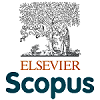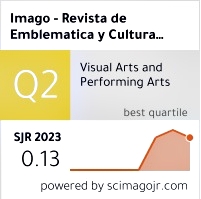Ethical oversight policy
The Editorial Team of IMAGO. Revista de Emblemática y Cultura Visual shall ensure the scientific quality of the publications, avoid bad practices in the publication of the research results and manage the edition of the received papers in a reasonable time. It shall deal with allegations properly, being willing to publish, where appropriate, retractions, corrections, clarifications and apologies.
The editor and the editorial staff are committed to the confidentiality of the submitted manuscripts, their authors, reviewers, potential reviewers and other editorial advisors, so that anonymity preserves the intellectual integrity of the entire process. The publisher undertakes not to disclose information regarding articles sent for publication to other persons than authors, reviewers and editors.
In case of conflict of interest, whoever is in any of the following cases will refrain from intervening in the evaluation of the proposed text. A conflict of interest arises when a text received in the journal is signed by a member of the Editorial Team, by one who has a direct personal or professional relationship with it, or is closely related to the past or present research of the person who is member of it.
The editor guarantee the selection of the most qualified peer reviewers according to academic and ethical standards. External reviewers will be provided with a standard review form enabling them to assess papers following criteria of originality, relevance for the field of knowledge, methodological rigour and formal presentation. The editor must monitor the peer review process by giving guidance and support to the reviewers, in order to facilitate rigorous, fair and effective peer review.
Guided by the policies of the journal’s editorial board, the editor is responsible for the acceptance or rejection of an article submitted to the journal. The validation of the work in question and its importance to researchers and readers must always drive such decisions. The editor should carry out his or her duties in a balanced, objective, and fair manner, without discrimination based on gender, sexual orientation, political or religious beliefs, ethnic or geographic origin of authors.
Unpublished materials disclosed in a submitted manuscript must not be used in an editor’s own research without the express written consent of the author. Privileged information or ideas obtained through peer review must be kept confidential and not used for personal advantage.
Identification of unethical behaviors or malpractice
The journal warns that academic fraud will not be tolerated. There is academic fraud when a publication is not true in whole or in part, and is the product of deception (making up results out of fabricated data; falsifying data and deliberately omitting facts or data) or plagiarism (when an author introduces results, ideas, or data created by others as his/her own; when a text is copied without quotation marks or without indication of source; also when this pre-existent text appears as the author’s own with a few words changed, or in paraphrase, and lacks acknowledgement of the significant assistance of others).
If those practices are detected in the editorial process, publication will be immediately rejected, and the journal will reprimand the author. If the way of academic fraud is plagiarism, the paper will be sent immediately to the real author, so that s/he can undertake appropriate legal action. If the journal detects academic fraud once the work has been published, it will add a statement in which the author’s fraud will be denounced in full. This statement will also appear on the journal’s website and at the bottom of the following issue’s table of contents.
To prevent duplicate publication, the journal requires the author’s declaration of originality, as well as a statement that it is not being sent simultaneously elsewhere, when s/he submits her/his work. An attempt at redundant publication without notification will be looked upon severely by the journal, which will take measures identical to those set out in the case of academic fraud, whether the case is discovered in the editorial process, or when the article is already published. In the latter case, the journal will make a statement of redundant publication in its pages, with or without the author’s consent.
Measures to be taken in substantiated cases of ethical misconduct or malpractice
Anyone who believes that research published by IMAGO has not been carried out in line with the above principles, should raise their concern with the editor. Concerns will be addressed by following COPE guidelines where possible.
The author involved will be the first to have the opportunity of responding to the allegations made. If the response is not satisfactory, the Editorial Board will resolve the problem either by consulting experts in the matter or by any other means they consider to be appropriate. If the complaint is upheld, the publication of a correction, retraction, expression of concern, or other note, as may be relevant. Every reported act of unethical publishing behaviour must be looked into, even if it is discovered years after publication.
If an author feels the need to make a complaint, s/he should direct it to the editor. The editorial board will then study whether there is a basis for this complaint within the journal’s rules, and will respond to the author as soon as possible: either indicating that there is no case for complaint under the rules, or otherwise by communicating which steps will be taken by the board in order to solve the conflict.
The Journal editor will publish corrections, clarifications or apologies when appropriate, in line with COPE’s Retraction Guidelines. Retractions are usually reserved for articles that are so seriously flawed that their findings or conclusions should not be relied upon.
Gender equality best editorial practices
The Editorial Board is committed to promoting equality and non-discrimination in the academic and scientific fields. In this sense, it is committed to ensuring a balanced presence of women and men among the members of the Editorial Board, as well as among the evaluators and authors, whenever possible, in the latter case.
Imago urges the integration of a gender perspective in research. This implies, at the very least, the elimination of androcentric biases in the design, content and results of research, as well as the inclusion of scientific contributions by women. In the manuscripts, the authors should use a language free of bias, avoid stereotypes and the concealment of women behind the generic male, and commit to inclusive language. It is recommended to consult the triptych "Cap a la igualtat, des del llenguatge" and the "Guía de uso para un lenguaje igualitario" of the Unitat d'Igualtat of the Universitat de València.
Likewise, it is suggested that the text reports on the data of origin of the research taking into account sex, in order to allow the identification of possible differences.














